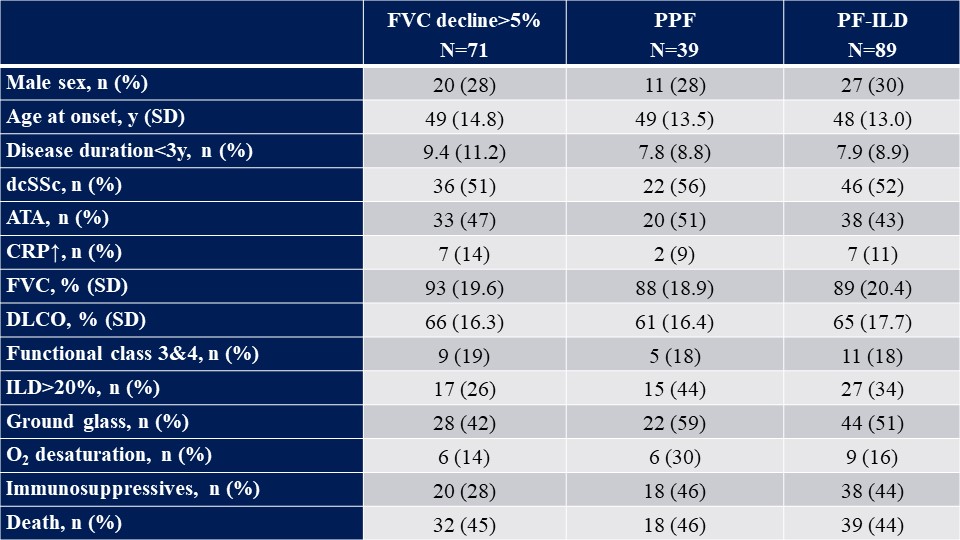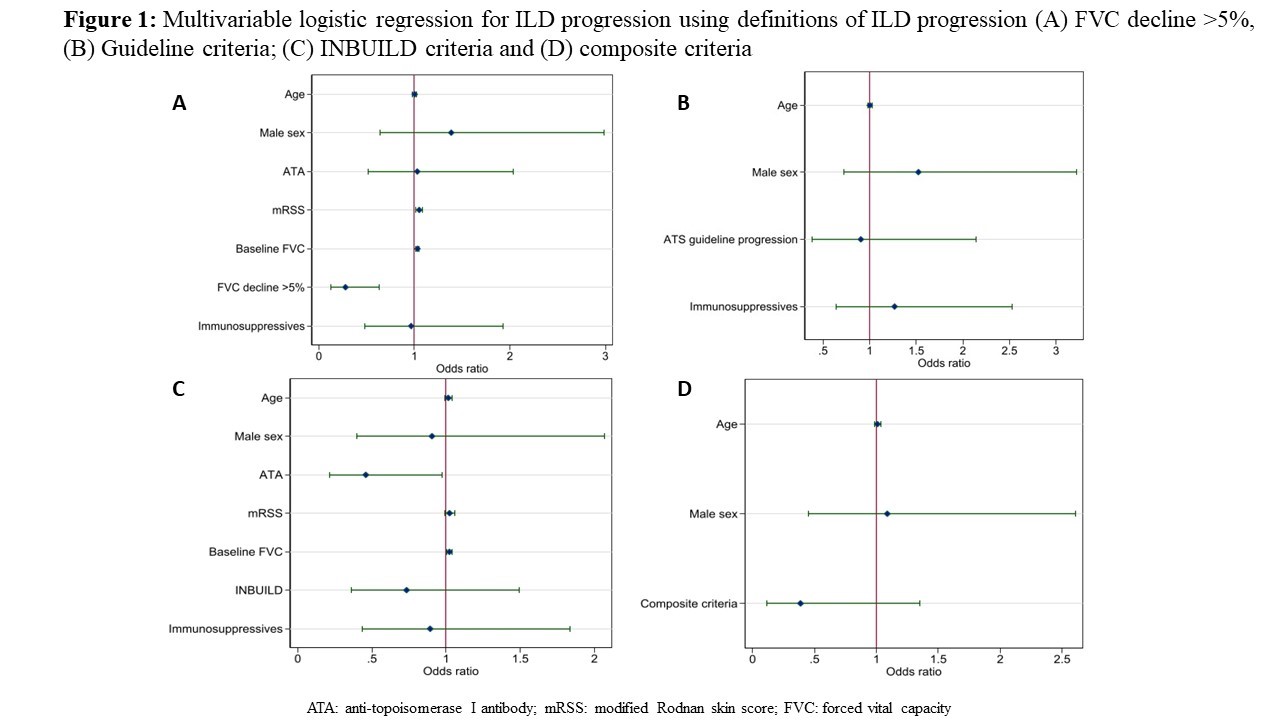Session Information
Date: Sunday, November 12, 2023
Title: (0609–0672) Systemic Sclerosis & Related Disorders – Clinical Poster I: Research
Session Type: Poster Session A
Session Time: 9:00AM-11:00AM
Background/Purpose: In clinical practice, we often wait for progression of interstitial lung disease (ILD) in systemic sclerosis (SSc) to initiate or escalate therapy. Similarly, progressive SSc-ILD patients are recruited into trials to enrich for further progression. These strategies assume that patients with recent ILD progression have a higher risk for further progression. Here, we assessed whether ILD progression predicts subsequent progression using four definitions of progressive disease.
Methods: We included all SSc patients from two expert SSc centers who had ILD on HRCT and consecutive annual forced vital capacity (FVC) measurements. For the primary analysis, ILD progression was defined as absolute FVC decline ≥5% over 12 months. Patients were grouped into progressors (FVC ≥5% decline) and non-progressors (all others). At the next annual follow up visit, all patients were again assessed for ILD progression. In secondary analyses, we applied other definitions of progression such as:
- 2022 ATS/ERS/JRS/ALAT PPF guideline criteria with (1) worsening of respiratory symptoms; (2) absolute decline in FVC ≥5% or in DLCO ≥10% and (3) disease progression on HRCT over 12 months
- INBUILD PF-ILD criteria with (1) FVC decline ≥10%, (2) FVC decline >5%-< 10% and worsening of respiratory symptoms or an increased extent of fibrosis on HRCT, or (3) worsening of respiratory symptoms and an increased extent of fibrosis within 24 months
- Composite criteria with decline in FVC ≥10%; or FVC ≥5%-9% and DLCO >15%.
Multivariable logistic regression was applied, adjusting for known risk factors of ILD progression, including treatment.
Results: In total, 231 SSc-ILD patients were included (Table 1). At 12 months, 71 (30.7%) showed FVC decline >5% and were classified as progressors. In multivariable logistic regression ILD progression was significantly protective for further progression at the next annual follow-up (Odds Ratio 0.28, 95%CI 0.12-0.63, p=0.002, Figure1a). When other definitions of progression were applied, similar results were obtained: 39 (19%) fulfilled the PPF guideline criteria, 89 (39%) the PF-ILD criteria and 33 (14%) the composite criteria. Multivariable regression analysis adjusted for age, sex and treatment (PPF), for age and sex (composite) and for age, sex, anti-Topoisomerase I antibody (ATA), modified Rodnan skin Score (mRSS), baseline FVC and treatment (PF-ILD) showed the same direction as the primary analysis (Figure1b-d).
Conclusion: SSc-ILD progression does not predict further progression using any definition of ILD progression. These results challenge current treatment practice, since waiting for progression to initiate or escalate treatment does not seem to be the adequate strategy.
To cite this abstract in AMA style:
Hoffmann-Vold A, Petelytska L, Fretheim H, Aaløkken T, Becker M, Jenssen Bjørkekjær H, Brunborg C, Bruni C, Clarenbach C, Diep P, Dobrota R, Durheim M, Elhai M, Frauenfelder T, Jordan S, Langballe E, Midtvedt O, Mihai C, Molberg O, Distler O. Progression of Interstitial Lung Disease in Systemic Sclerosis Does Not Predict Further Progression [abstract]. Arthritis Rheumatol. 2023; 75 (suppl 9). https://acrabstracts.org/abstract/progression-of-interstitial-lung-disease-in-systemic-sclerosis-does-not-predict-further-progression/. Accessed .« Back to ACR Convergence 2023
ACR Meeting Abstracts - https://acrabstracts.org/abstract/progression-of-interstitial-lung-disease-in-systemic-sclerosis-does-not-predict-further-progression/


